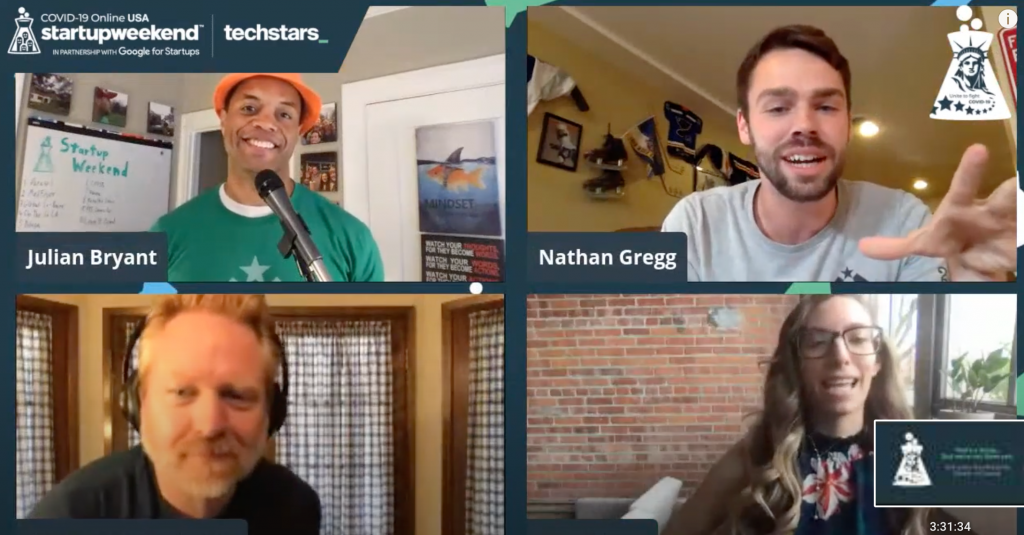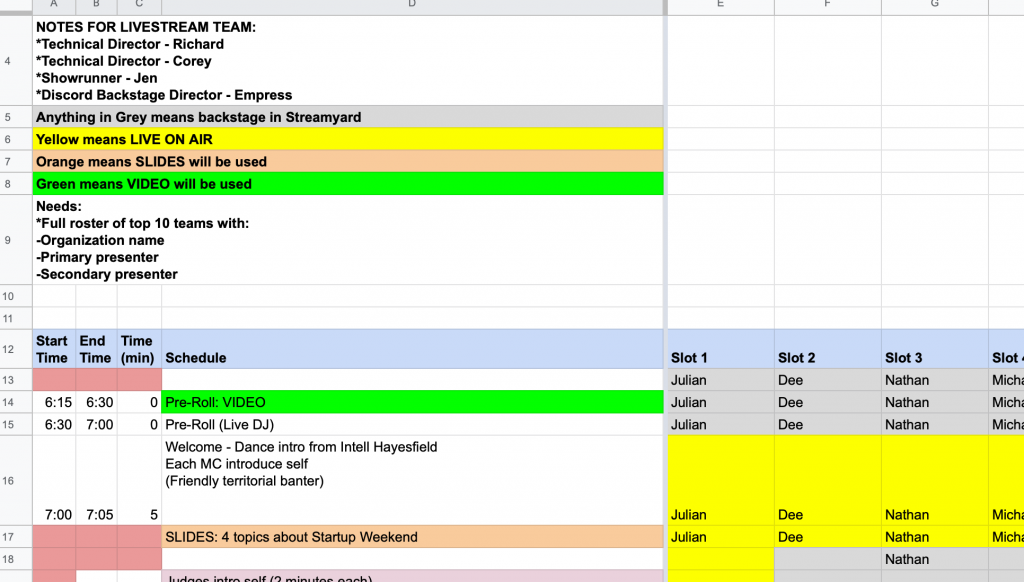Last weekend, I got to participate in the largest Startup Weekend event I’ve ever been a part of and it was an incredibly rewarding and educational experience. In one weekend we helped launch 50+ new startup companies. What I want to share in this post is what I learned about organizing large virtual events during this time of social distancing. As I have mentioned, for years I have volunteered as a Community Organizer and Facilitator for Startup Weekend. At a given event we’ll have around 100 participants who are a collection of designers, developers, and business folks. Participants will pitch an idea for a startup they’d like to launch on Friday night; we’ll help them form teams around the ideas that have the most interest; and those teams will work all weekend to hopefully launch a new startup by Sunday night. Sunday nights usually consist of a series of pitches by these teams to a panel of judges who will give them feedback on how they can be successful with their new startups.

Startup Weekend usually does around 800-1000 event each year around the world. I’ve been a part of around 50 events (helping to organize around 16 of them in San Diego). At the start of this social isolation, all of these events came to a halt. However, quickly a team formed to start planning an online version of the event that would encourage participants to pitch ideas for startups that will solve problems created in a world now faced with the COVID-19 crisis. I was honored to be asked to help the event by helping emcee the Friday evening and Sunday evening livestream events.
The event itself was a wonderful success, we had around 950 participants. They formed 50+ teams for new startups. We had 200+ mentors to help advise those teams during the weekend and 30+ facilitators to help connect teams to mentors, resources, and guide them during the weekend. These numbers are just for the US event. There are plans to do similar events for countries around the world.
Discord for Community Logistics
At a normal event, a lot of the value participants get is meeting new people and forming teams to work on exciting new startup ideas. These teams tend to either work in their own breakout rooms, or (preferably) in their own section of a much larger venue space. During the weekend organizers, the Facilitator, and mentors can float between teams answering questions and offering advice. Providing a similar experience for 900+ participants remotely was going to be a large challenge. The organizing team decided to use Discord as the primary tool for event logistics and community-building during the weekend.
For folks who aren’t familiar with Discord, in some ways it is a competitor to Slack, a common business communication tool. However, where voice and video communication feels like an after-thought in Slack, these are some of the biggest strengths of Discord. On both platforms, conversations can be organized into “channels.” Discord makes it easy for these channels to either be voice or text-based channels. Discord also allows for very advanced permission setting within channels. For this event each team had their own channels and we had dedicated channels for mentors, organizers, as well as tech support. The support channels (and commiserate staffing) was key for this event as many participants required different degrees of tech support during the weekend. Facilitators were assigned to teams and they facilitated the connections between teams and mentors and were really the glue helping ensure the participants had a good experience.
Managing the Livestreams
Speaking of Facilitators, at a normal Startup Weekend event organizational duties are usually split between the local organizing team and the Facilitator where the local team is responsible for finding a venue, sponsors, mentors, and marketing the event locally. In the weeks leading up to the even the Facilitator helps advise the team in these areas, but once Friday night rolls around, the Facilitator is usually responsible for making sure the minute-to-minute schedule of the event runs smoothly and is often emcee or co-emcee of the event. When time allows Facilitators also like to engage with advising teams. For this event, the Facilitator role was drastically different, primarily focused on advising teams. The role of emcee for Friday and Sunday because its own discreet task. This proved to be entirely necessary because producing smooth internet livestream shows turned out to take a lot more effort and practice than is normally required for in-person events.

For example, the Sunday evening event had the top 10 teams doing live pitches to a panel of judges. In practice what this meant was organizing a livestream show with 4 emcees, a DJ, 10 teams each having 2 presenters, their respective slide decks, and panel of 3 judges. Juggling all of these characters remotely took a lot of work. I was super-impressed with the technical team that was able to pull this off and I learned a ton in the process. Above is a partial screenshot of a run-of-show spreadsheet we used to manage the 3 1/2 hour show down to the minute. Our technical check and dress rehearsals took most of Saturday afternoon, so it would have been impossible to both act as Facilitator engaging teams and mentors and prepare for the Sunday presentations. You can see the final show here.
I’m proud of the small role I had in the event as emcee, and incredibly impressed with the 40+ member organizing team that worked hard for weeks to pull of this amazing event. I think we were able to capture much of the magic that happens at normal events in this virtual event and I think it scaled really well to accommodate the 900+ participants. Of course there are things that we learned and would do differently and the organizing team continues to meet to refine strategies for doing these events online and share information with other Startup Weekend organizers. I’m looking forward to the next event and seeing even more specialized events perhaps for the LGBT or recovery communities.
(A version of this article was originally published on Julian’s Slay Today! website)